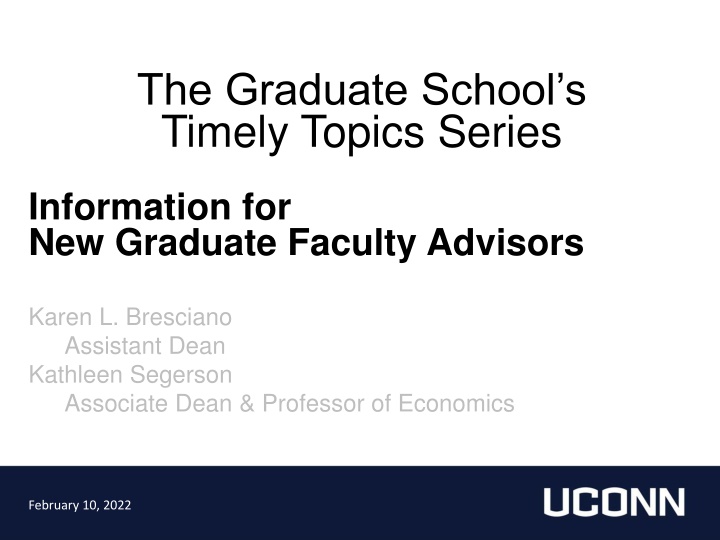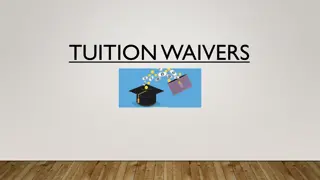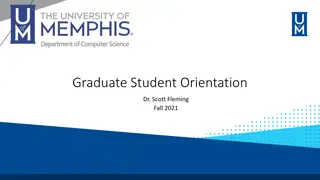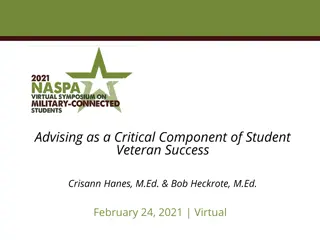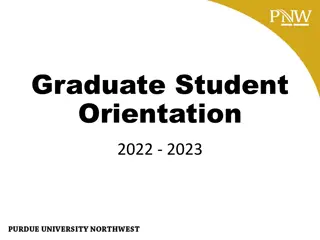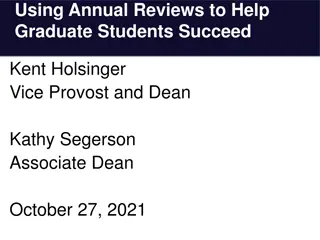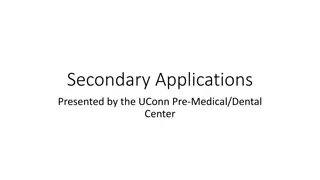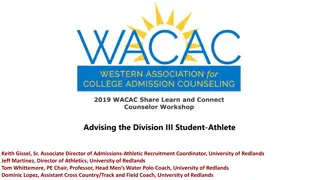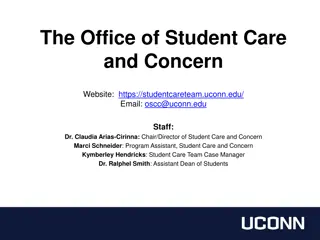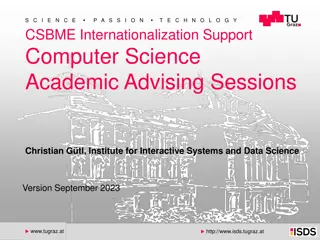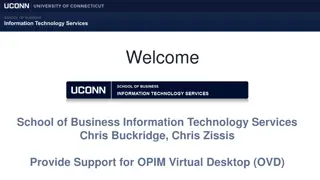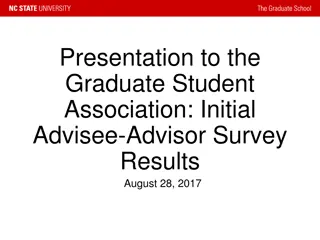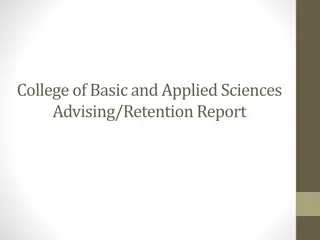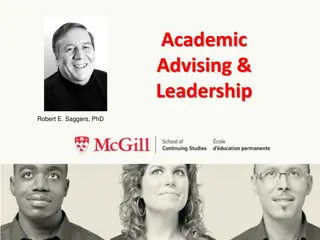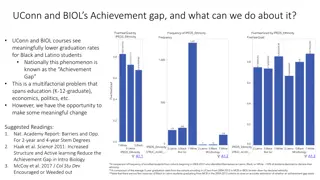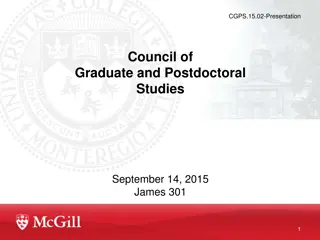Effective Graduate Student Advising at UConn: Roles, Responsibilities, and Challenges
Learn about the graduate student advising process at UConn, including the roles and responsibilities of advisors, tips for being a good advisor, dealing with advising challenges, and available resources. Explore the impact of mental health in graduate education and the degree requirements set by The Graduate School. Understand the diverse forms of advisor-student relationships in course-based and research-based programs.
Download Presentation

Please find below an Image/Link to download the presentation.
The content on the website is provided AS IS for your information and personal use only. It may not be sold, licensed, or shared on other websites without obtaining consent from the author.If you encounter any issues during the download, it is possible that the publisher has removed the file from their server.
You are allowed to download the files provided on this website for personal or commercial use, subject to the condition that they are used lawfully. All files are the property of their respective owners.
The content on the website is provided AS IS for your information and personal use only. It may not be sold, licensed, or shared on other websites without obtaining consent from the author.
E N D
Presentation Transcript
The Graduate Schools Timely Topics Series Information for New Graduate Faculty Advisors Karen L. Bresciano Assistant Dean Kathleen Segerson Associate Dean & Professor of Economics February 10, 2022
Overview of todays topics How does graduate student advising work at UConn? What are the roles and responsibilities of advisors? What are some tips for being a good advisor? What are some advising challenges and how can you deal with them? What resources are available to help with advisors?
Things to Keep in Mind Past: What do you remember (good and/or bad) about your own advisor, and what can you learn from your own experience? Future: What kind of advisor do you hope to be?
Opportunity for Positive Impact Evidence for a mental health crisis in graduate education Teresa M Evans, Lindsay Bira, Jazmin Beltran Gastelum, L Todd Weiss & Nathan L Vanderford VOLUME 36 NUMBER 3 MARCH 2018 NATURE BIOTECHNOLOGY
Advising at UConn Every UConn graduate student must have a major advisor (or co-major advisors) who is a member of the Graduate Faculty. Most also have a 3-4 person advisory committee, chaired by the major advisor. Some programs have a non-faculty director or other staff person who does most of the advising and acts on behalf of the faculty member who is the designated major advisor At UConn, major advisor/advisory committee determines when/if a student has met the requirements for a given degree (or certificate), subject to Graduate School (and potentially program-level) minimum requirements.
Degree Requirements The Graduate School sets minimum degree requirements Minimum credit requirements (30 for master s, 30-45 for PhD, including required research credits) Minimum GPA requirements (3.0) Allowable credit sharing and transfer credits Time limits (6 years for master s, 8 for PhD) Programs can set additional requirements. Major advisors/advisory committees can also set requirements for students, as long as they are clearly articulated to students and applied equitably.
Key Forms of Advisor-Student Relationships In course-based programs: advisor primarily provides information to students In research-based programs: apprenticeship model advisor works closely with student relationship often evolves from supervision to collaboration
Key Roles and Responsibilities of (Major) Advisors Information and advice about program completion Courses to take Other program requirements Places to look for information (e.g., graduate catalog, Graduate School, program handbooks, websites) Research supervision and training Professional development assistance Career advice/counseling Career enhancement opportunities Approvals (or recommendations) related to academic program Completion of degree requirements (plans of study, general exams, dissertation defenses, etc.) Some course-related approvals (e.g., withdrawals, Pass/Fail) Program interruptions/terminations (e.g., leaves of absence, dismissals) Advice and referrals to address student needs and concerns
Advisors vs. Mentors An advisor might or might not not also be a mentor. A mentor might or might not also be an advisor. What s the difference?
Advisors vs. Mentors Mentors Advisors Student-mentor relationship is more personal Mentors often focus more on the overall well-being of the student Mentors are typically chosen based (at least partially) on other (personal) characteristics Mentors provide advice and can serve as personal role models Student-advisor relationship is more professional Advisors typically focus primarily on academic progress Advisors are often chosen or assigned based on expertise or training Advisors provide advice and can serve as professional role models
Tips for Good Advising/Mentoring Overarching Tip: Foster meaningful 2-way communication 1. Communicate clearly, constructively, and regularly 2. Provide clear, constructive, and regular feedback to students 3. Seek feedback from students on the effectiveness of communication Source: https://rackham.umich.edu/downloads/how-to-mentor-graduate-students.pdf
Tips for Good Advising/Mentoring Expectations Be transparent about expectations Academic expectations and standards Needed training (and where to get it) Personal and professional boundaries Academic Success Set and review milestones, and acknowledge student accomplishments Look for and create opportunities for students to succeed Help students learn from mistakes Encourage students to develop new skills and think critically and independently Overall Well-being Be open, approachable, and accessible Listen to student concerns and respond constructively Look for and respond to signs of stress/distress, and reach out as appropriate Source: https://rackham.umich.edu/downloads/how-to-mentor-graduate-students.pdf
Annual Academic Reviews Annual academic reviews can help advisors and students articulate and document both progress toward degree and expectations going forward. TGS has developed a template for doing annual reviews for doctoral/MFA students: https://grad.uconn.edu/faculty-staff-resources/managing- graduate-programs/annual-academic-evaluations/
Possible Advising Challenges Student is not making adequate academic progress Not completing coursework Not progressing adequately on research Student appears to be suffering from non-academic challenges (e.g., physical/mental health issues, other personal/family issues) Failure to see eye-to-eye or agree on plans moving forward Difficult inter-personal dynamics between advisor and advisee (personalities play a role in all relationships) Misunderstandings (typically due to communication issues)
Resources to Help TGS website: https://grad.uconn.edu/faculty-staff-resources/advising- mentoring/ TGS staff: Graduate Student and Post-Doctoral Student Affairs Team Karen Bresciano: karen.bresciano@uconn.edu Cinnamon Adams: cinnamon.adams@uconn.edu Megan Petsa: megan.petsa@uconn.edu Stuart Duncan: stuart.duncan@uconn.edu Things they can help with: Having difficult conversations Referrals to other university resources (e.g., mental health, CSD) Making changes when more is needed
When More is Needed Reduced course/credit load Implications for GA, financial aid, visa status Change of major advisor Separation Academic leave of absence Voluntary exit/change of program Dismissal Student Care Team
Dismissal Criteria for Dismissal 1. Failure to maintain the minimum cumulative grade point average required by The Graduate School (3.0); 2. Receiving a grade of D+, D, D-, F, or U in any course; 3. If required, failure to satisfy a foreign language requirement for a degree; 4. Failure of the doctoral General Examination, if one is required; 5. Failure to produce an acceptable Doctoral Dissertation Proposal, if one is required; 6. Unsatisfactory performance in any aspect of the research or writing for a required master s thesis or doctoral dissertation; 7. Failure of a required final examination for the master s or doctoral degree; or 8. Failure to satisfy any other requirement of the student s graduate degree program. Dismissal vs Resignation
GA Supervision Overlapping roles as students and employees Union Contract for GAs employed at Storrs/regionals (not UCH) Protected work Time off (10/semester) Progressive discipline (Labor Relations) Alison Cutler (alison.cutler@uconn.edu) Ask for guidance Additional resources and referrals for GAs
International Students Visa status is impacted by enrollment add/drop program change dates of separation OPT/CPT and I-20 end dates Ask ISSS for guidance
Please Know what you know and what you don t know Know what things are your responsibility to know Know who is supposed to know what you don t know
Its not all you Center for Career Development Student Health & Wellness Counseling & Mental Health Financial Aid Office of National Scholarships & Fellowships Writing Center Student Care Team Cultural Centers International Student & Scholar Services Center for Students with Disabilities Registrar Library Graduate Student Senate Assoc of Area Religious Communities Graduate Employee Union And more
And, of course The Graduate School 860.486.3617 gradschool@uconn.edu
Upcoming Events Timely Topics Timely Topics is a series of opportunities to engage with subject matter experts on topics relevant to those who support and advise graduate students and programs. Every session is available to all UConn faculty and staff. If you have any questions or topic suggestions for the Timely Topics Series, please contact Megan Petsa (megan.petsa@uconn.edu). Digital Dissertations - How to Embark on Digital Scholarship at the Graduate Level Thursday, March 24, 2022 at 1:00 pm Register Understanding Employment Rules and Opportunities for International Students: CPT, OPT and On Campus Employment Thursday, April 7, 2022 at 2:00 pm Register Supporting Graduate Students in Communication of Their Research Through 3MT Thursday, April 21, 2022 at 11:00 am Register
Upcoming Events GradSlate GradSlate Training Presentations are a series of conversations and demos focused on a specific aspect The Graduate School s online application and CRM system, Slate. These events are appropriate for faculty and staff involved in recruitment and admissions to UConn graduate programs. Please join us to get a deeper understanding about a topic, ask your questions, provide feedback, get tips and tricks, and see new features. If you have any questions or topic suggestions, please contact gradslate@uconn.edu. Reports Tuesday, February 15, 2022 at 2:00 PM Register CRM Overview Tuesday, March 15, 2022 at 2:00 PM Register Intro to GradSlate / Slate for Graduate Admissions Wednesday, April 6, 2022 at 2:00 PM Register
